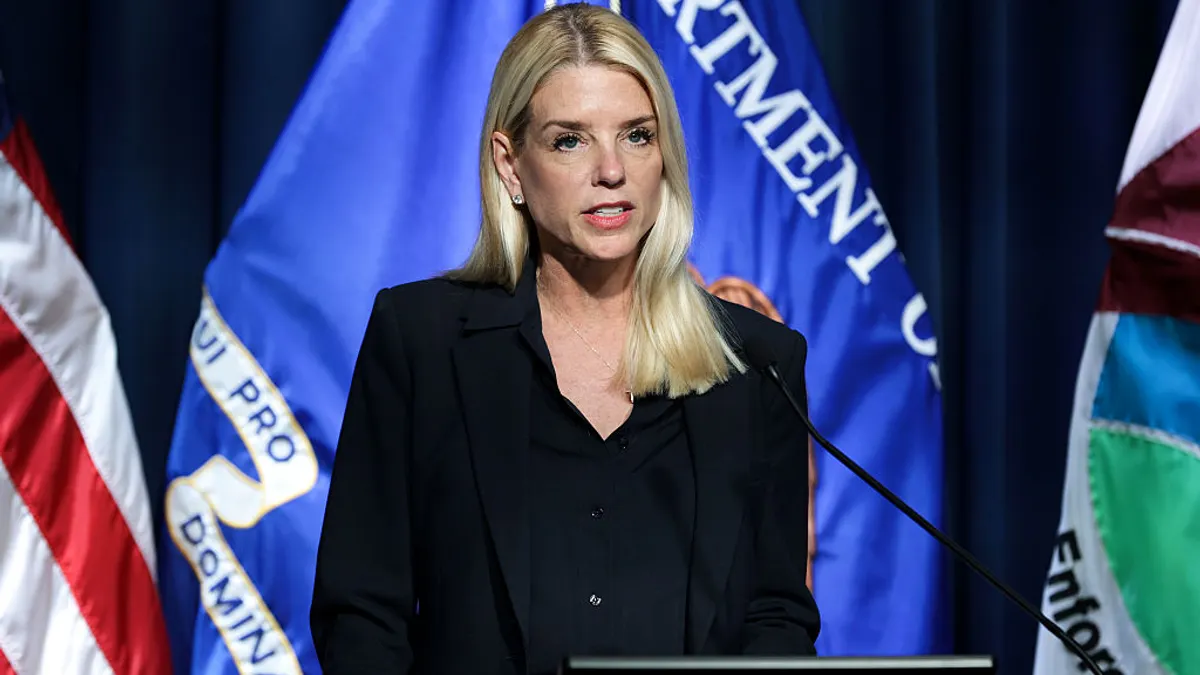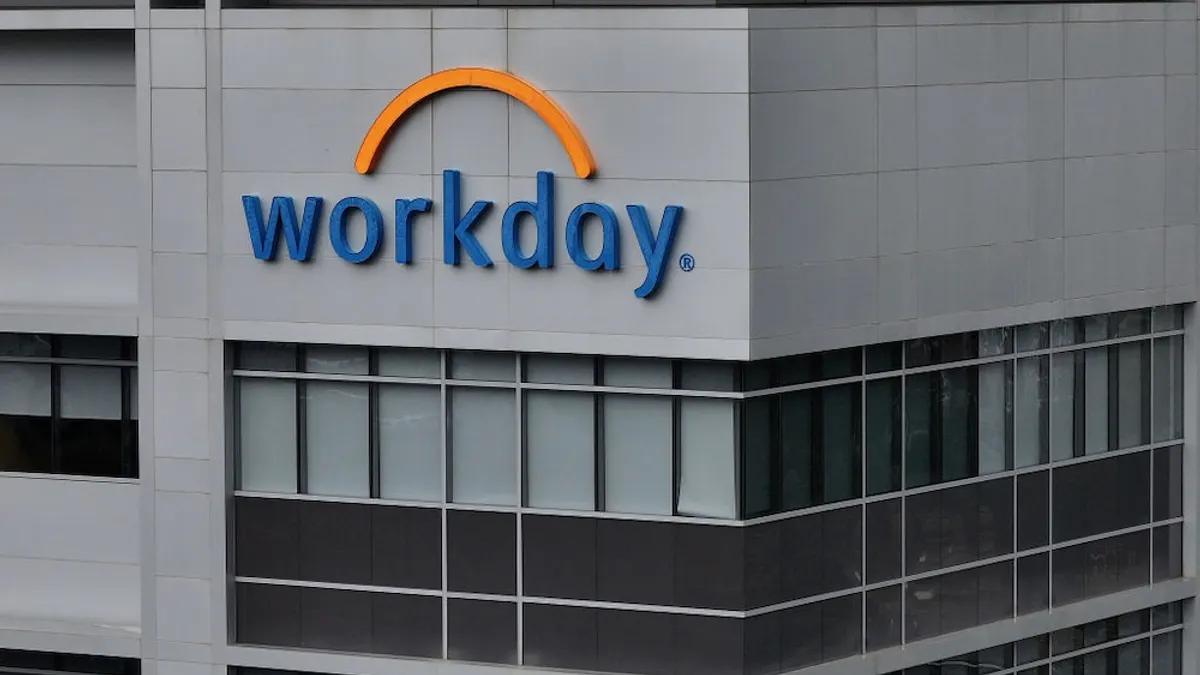Editor's note: This story is part of a series based on HR Dive's Identity of HR 2021 Survey. Readers may view additional insights and articles or purchase the full report.
HR professionals who feel they have a lot on their plates in 2021 may not be alone.
According to the results of HR Dive's 2021 Identity of HR Survey, which drew responses from 419 self-identified HR professionals, approximately 75% of respondents said they performed duties outside of the HR department, either on an ad hoc basis or as a permanent part of their jobs.
It is not a stretch to say that the job of HR is getting more complicated, according to Christopher Collins, associate professor of HR studies at Cornell University's School of Industrial and Labor Relations. Collins told HR Dive in an interview that this impression is similar to what he and others at Cornell hear when interacting with company officials. The reasons behind that growing complexity are many and varied.

NO
25%
Do you perform
YES,
45%
duties outside of the
sometimes on
an ad hoc basis
HR department?
YES,
31%
as a permanent
part of my job
One such factor is that HR is becoming more broadly involved in company strategy, said Ann Feyerherm, professor of organizational theory and management at Pepperdine University's Graziadio Business School, which is itself a reflection of high-level trends, from the business environment to the nature of modern work to society at large. "Part of that has now impacted HR executives and business partners as well," she said.
Relatedly, the HR industry has experienced a "strong push" to be the type of "strategic business partner" that has long been the subject of conference panels, said Brian Kropp, group vice president and chief of HR research at Gartner. That role includes assisting with workforce planning and redesigning roles within an organization to suit future needs.
Increasingly, HR teams are being asked to answer questions such as "how can we take advantage of the workforce we've got, augment it and build [it] to be more successful," Kropp added. And on a larger level, he said, HR's strategic function identifies how an organization can get from where they are now to where they need to be.
But 2020's various crises have added wrinkles to an already complex profession, providing opportunities for HR professionals to rethink their roles.
What additional duties are being performed?
Even before the worst pandemic in at least a century coincided with a societal reckoning on systemic racism, organizations were becoming more cognizant of their impact on consumers and the communities in which they operated, according to Collins.
"Reputational things really do matter," he said. "It's created more of an awareness in business leaders of how important these things are … not just what we do but how we do it."
That awareness has grown alongside greater transparency instigated by social media. Employees increasingly feel their employers should be involved in societal issues. Kropp pointed to past Gartner research showing the vast majority of global employees, 74%, said businesses should take a position on societal issues, even if those issues are not directly connected to business.
But the events of 2020 are also very human issues, leading organizations to pivot to HR — the department in charge of people — for guidance. "Everything including the kitchen sink gets laid upon HR because it's a human issue," Feyerherm said.
So those additional duties are likely to take the form of questions that HR teams have had to answer throughout the past year. Per Feyerherm, those are questions such as:
- What is our well-being program?
- What is our position on diversity and inclusion issues?
- How do we transition everyone to work from home?
- Are we paying people the same amount if they move to a lower-cost state?
It is a dynamic that can leave HR professionals with the impression that they are a consultant, or in Feyerherm's words, "another pair of hands" to address an acute problem that the rest of the organization may feel it does not have the bandwidth to solve.
These events also drive home why HR needs to build broader, deeper connections with employees and managers, Kropp said. Managing the societal and cultural questions of the day is part of that work, he added, because those questions can impact work itself.
"It's not just about who works for me," Kropp said. "Now, the conversation is that this is a person who happens to work for me. By making their life better, I'll make their work better."
An extension of that work is thinking about the impact of organizational brands and ethical behavior, Collins said. For example, HR can help organizations to become more efficient without negatively impacting the world around them. "That's a great place for HR to play a role," he noted.
Arguably, HR professionals were already accustomed to wearing several hats. Kropp said that HR duties typically fall into several buckets. There's HR's role as the emergency responder, dealing with the fallout of policy violations such as harassment or misconduct. There's HR's role as the employee mediator, ensuring the conflict between employees does not escalate.
And there's HR's role as the operations manager, building connections between employees and managers, aiding with succession planning and, in general, "making sure the trains are running," Kropp said. During the pandemic, much of this role has been devoted to ensuring the successful transition to remote work, all the while maintaining an authentic culture, Feyerherm said.
HR teams in different industries also deal with separate challenges, Collins said. In a retail organization, for example, HR professionals may be dealing with supply chain issues such as ethical sourcing. Similarly, in manufacturing, HR may have a say in how an organization is sourcing raw materials.
Finally, HR roles generally become more strategic the higher up in an organization they are, Collins noted. Higher roles are more likely to encounter the environmental and social components of operations as well as governance issues. Those on the front lines, meanwhile, primarily work on selection, training and diversity, among other categories.
Getting a seat at the table
As HR increasingly branches out into those complex people issues, it also finds itself up against the "historic tension" between itself and other executive-level positions — namely, the chief financial officer, Feyerherm said; "People are important, but we have an economic commitment to shareholders. Isn't that the purpose of business?"
It is a debate that persists in spite of recent efforts by U.S. business groups to reframe the purpose of modern corporations. Observers often cite the updated 2019 mission statement of the Business Roundtable, which includes commitments to invest in employees and deal fairly and ethically with suppliers, among other goals. While HR executives and CFOs do not always have tension, "I've seen it happen enough," Feyerherm said.
Even with the massive shifts brought on by 2020, there is evidence that those outside HR are skeptical about its enhanced role. Most C-suite executives in a recent Sage survey said pandemic-driven changes in HR "are only temporary," and more than half viewed HR as a largely administrative function despite those changes.
However, Collins said the pandemic has helped create an environment where HR is seen as "essential," emphasizing just how critical "the people part" of day-to-day operations and strategy is. More and more CEOs, he added, "have become enlightened to how HR drives performance." CEOs also want HR to be an active participant in high-level discussions, Collins said, and they want HR leaders who also can bring a business perspective to those discussions.
In short, "there's a lot riding on the HR professional to show value," Feyerherm said. "If you can provide value, then people invite you to the meeting, to the table, for big conversations."
Not all organizations are built equally, though, and sometimes the response to a people-related crisis may not match the response to other crises. Kropp gave the example of a liquidity crisis in which an organization might immediately turn to the CFO for answers on how to move forward. That same logic is not always applied to problems involving personnel.
"A lot of senior leaders think they're experts in HR just because they manage people," Kropp said, "but that is the same expertise I would have in finance by having a checking account."
That's why HR has to have the courage to speak up as an active participant, Collins said. It is not enough, he added, to have a seat at the table and receive directions from other parts of the organization; "There are some points where HR needs to push ... to speak up and share their unique insights."
Technological developments have allowed HR to potentially move into a more strategic role, sources noted. The adoption of artificial intelligence in areas like recruiting, combined with the broader outsourcing of routine activities such as payroll processing, can allow HR to focus more time on core business needs, Collins said.
But there are downsides to this as well. Traditional HR tasks that have been converted to self-service or automated models are not always utilized by managers or workers, Kropp noted. And there are questions about what such changes mean for the long-term development of HR professionals broadly. "Where do people build their initial acumen for HR in order to get these higher level jobs?" Collins noted.
Developing an analytical mindset
As a means of getting to that strategic role, some HR departments have taken it upon themselves to invest in people analytics and statistical analysis.
A 2020 report by tech platform Acuity found that employee relations teams, in particular, were reporting data to compliance and diversity and inclusion teams, as well as managers, in 2019. More than half of those tracking employee relations data said access to more advanced or predictive analytics would be "very helpful" in helping them do their jobs.
All that investment, however, is not a guarantee that data are meaningfully connected to business objectives, Collins said. HR teams, he noted, sometimes fail to link statistics in areas such as training and recruitment to organizational success and customer satisfaction.
Improving analytical capabilities is just one way that HR professionals can rethink and reinvent their roles in 2021, Feyerherm said. One possible route for organizations, she added, is to provide HR teams greater ability to reskill themselves and develop such capacities.
Kropp, on the other hand, said he does not necessarily think that HR teams need more data in all cases, or that HR professionals need to be data scientists themselves. "But what is critical [is that] HR becomes a better data consumer," he said. "How do we actually take that data that we've got and turn that into ideas and decisions?"
Either the metaphorical plate is filling up fast, or it is simply changing to accommodate the shifting needs of organizations in a post-pandemic, post-digital transformation environment. Perhaps it is a bit of both. Regardless, HR has the spotlight in the current moment and expectations are high.
"The HR people who were prepared for that really excelled," Collins said. "For those who weren't prepared, there's been backlash."





















